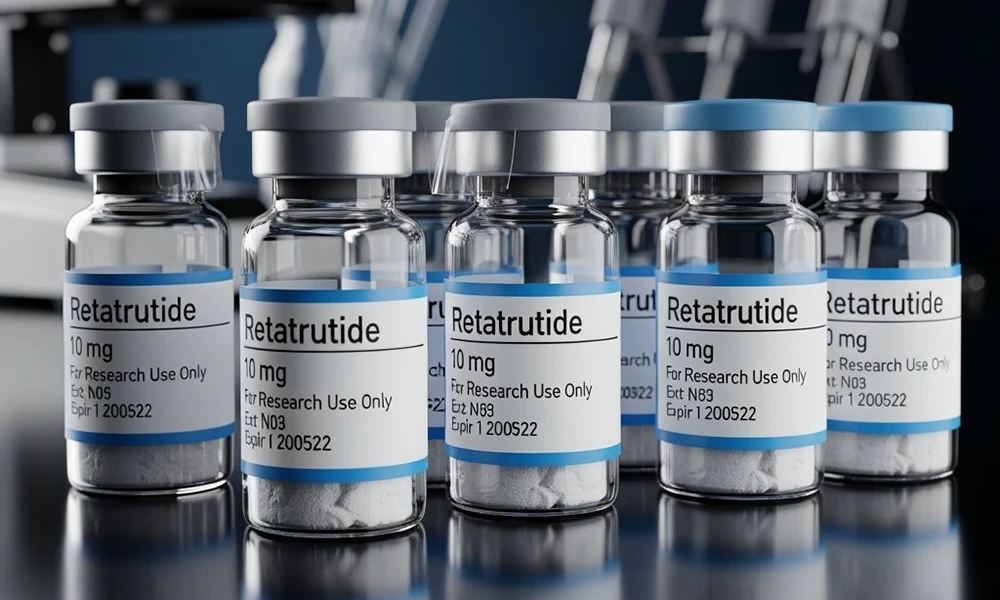Key Takeaways
- Berberine, psyllium husk, and pomegranate extract are promising natural alternatives to Ozempic for weight loss, each with unique properties that mimic or enhance GLP-1 agonist benefits.
- Natural supplements like aloe vera, magnesium, and konjac fiber also offer potential benefits for weight management and blood sugar control, but their efficacy and safety should be monitored with healthcare guidance.
- Transitioning from pharmaceutical options like Ozempic to natural alternatives requires careful planning and consultation with healthcare providers to avoid potential risks and ensure continued health management.
Ozempic is known for its effective weight loss benefits, but you might prefer natural substitutes with fewer side effects. This article introduces promising options like berberine, psyllium husk, and pomegranate extract, and explores how they compare to Ozempic.
Introduction
The allure of Ozempic, stemming from its roots in the clinical success of GLP-1 medications, has captured the attention of many in their quest for weight loss. Yet, amid this surge, a rising tide of interest flows towards the shores of natural alternatives. These alternatives are beckoning with the promise of accessibility, affordability, and a halo of safety often associated with ‘natural’ labels. But, how do these natural options stack up against the pharmaceutical titan Ozempic?
Understanding Ozempic and Its Effects
Ozempic, known generically as semaglutide, has made headlines as a revolutionary GLP-1 receptor agonist, acclaimed for its weight loss and blood sugar control prowess. With a remarkable majority of clinical trial participants achieving significant weight reduction, its effectiveness is hardly in question. However, not everyone basks in the glory of Ozempic’s results, and for those seeking more autonomy over their health choices, the shine of natural alternatives becomes irresistible.
The term ‘natural Ozempic alternatives’ conjures images of nature’s bounty offering a gentler path to the same destination. From the rich earth springs a variety of natural supplements, each claiming to offer a piece of the weight loss puzzle without the constraints and costs of prescription medications. Is there any truth to these natural options’ effectiveness? How well do they measure up against Ozempic?
Exploring Natural Alternatives to Ozempic
Delving into the realm of natural alternatives, we encounter promising candidates such as berberine, psyllium husk, and pomegranate extract. Each of these natural marvels carries unique properties that may mimic or even enhance some of the benefits attributed to GLP-1 agonists like Ozempic.
We’ll delve into the details of these natural substitutes, including natural compound options, and their potential to revolutionize the field of weight management.
Berberine: Nature’s Answer to Weight Loss

Berberine is a golden nugget in the world of dietary supplements, drawing its potency from shrubs such as barberry and Oregon grape. Known to enhance insulin sensitivity and lower blood sugar levels, berberine activates an enzyme that regulates metabolism, echoing the actions of GLP-1 agonists. Could this plant-derived supplement be the key to unlocking a healthy weight loss journey?
Despite the affordability of a month’s supply of berberine, research into its effectiveness in curbing appetite and promoting weight loss is still in its early stages. Studies suggest that taking berberine can indeed lead to weight loss and improvements in BMI and waist circumference, making it a compelling companion for those looking to shed pounds naturally. As with any supplement, it is paramount to consult with a healthcare provider to navigate the proper dosage and potential side effects.
Psyllium Husk: The Poor Man’s Ozempic

Psyllium husk, often referred to as the “poor man’s Ozempic,” is a humble yet powerful fiber supplement that swells up in the gut, promoting a feeling of fullness and aiding in weight management. This soluble fiber not only assists with weight loss but can also be a boon to those striving for healthy cholesterol levels. Could this be the cost-effective alternative to expensive weight loss medications?
As with all health interventions, the efficacy of psyllium husk, particularly in relation to type 2 diabetes, is still being investigated. However, its role in promoting satiety and potentially contributing to minor weight loss is a beacon of hope for those seeking a natural path to a healthier lifestyle.
Pomegranate Extract: A Natural GLP-1 Booster

Pomegranate extract, a jewel in the crown of dietary supplements, has emerged as a natural GLP-1 booster. By stimulating the secretion of this pivotal hormone, pomegranate extract not only aids in regulating blood sugar but also plays a vital role in weight management. Can this fruity elixir offer a sweet solution to those looking for an alternative to semaglutide drugs?
The enhanced GLP-1 secretion that pomegranate extract facilitates could be a game-changer in the field of natural ozempic alternatives. Its potential to improve blood sugar levels and support healthy weight loss makes it an attractive option for individuals looking to manage their weight naturally.
Additional Natural Compounds for Weight Management
Aside from the notable contenders already discussed, there are other natural stars shining on the horizon of weight management. These include aloe vera, magnesium, and konjac fiber – each with unique attributes that may support weight loss and blood sugar control. We’ll examine these supplementary natural substances and their possible contributions to a balanced diet.
Aloe Vera: Benefits Beyond Skin Care

Aloe vera, a plant celebrated for its skin-healing properties, also boasts a repertoire of health benefits that extend to weight management. This succulent plant’s supplements are known to lower blood glucose levels, improve cholesterol profiles, and support weight loss by reducing body fat percentage. Could aloe vera be the soothing answer to managing blood sugar and cholesterol?
While aloe vera supplements show promise, it’s important to approach them with caution. Adverse reactions are possible, and they may affect cholesterol levels and insulin resistance. As with any natural alternative, consulting with a healthcare provider is crucial to ensure safe and effective use.
Magnesium: Essential Mineral for Metabolism

Magnesium, a mineral essential for life, plays a critical role in metabolism and overall health. By aiding in energy production and improving insulin sensitivity, magnesium offers a multifaceted approach to regulating metabolism and controlling blood sugar levels. Could this mineral be the missing piece in the metabolic puzzle?
Though generally considered safe, certain supplements, including magnesium, can sometimes cause gastrointestinal discomfort. It’s important to assess gut health before integrating magnesium into one’s diet to avoid potential issues.
Konjac Fiber: Aiding Digestion and Weight Loss

Konjac fiber, derived from the konjac plant’s root, is a dietary champion known for its weight loss advantages. By slowing digestion and promoting satiety, konjac fiber helps manage blood sugar spikes and supports weight loss. Could this fiber be the key to maintaining a steady blood sugar level and aiding in weight management?
The ability of konjac fiber to reduce the glycemic index of meals and enhance feelings of fullness makes it a valuable ally in the fight against weight gain. A consistent diet incorporating konjac fiber could be a strategic move for those aiming to lose weight healthily and sustainably.
Comparing Natural Alternatives to Pharmaceutical Options
When it comes to health benefits, natural alternatives like berberine may not only have fewer side effects but also offer additional advantages over pharmaceutical options. For instance, berberine has been shown to improve health markers such as blood pressure and LDL cholesterol, potentially reducing heart disease risk – benefits that go beyond simply lowering blood sugar levels.
Pharmaceuticals, while effective, can sometimes come with a host of side effects. Metformin, for example, is notorious for its gastrointestinal disturbances, and serious side effects like lactic acidosis cannot be ignored. Comparatively, berberine and other natural compounds may present a gentler option for those concerned about the adverse effects associated with other medications.
How to Integrate Natural Alternatives into Your Routine
Integrating natural alternatives into your daily regimen should be done thoughtfully and with the guidance of a healthcare provider. Choosing high-quality supplements from reputable manufacturers is essential to ensure safety and efficacy. Staying well-informed about the potential benefits and considerations of different natural alternatives empowers you to make well-informed choices about your health.
Incorporating physical activity is another cornerstone of maintaining weight loss. Aiming for at least 150 minutes of moderate to vigorous activity weekly, based on your body weight, can significantly complement the use of natural alternatives. Always maintain an open dialogue with your healthcare provider to receive personalized guidance and ensure any new supplements, including weight loss drugs, are safe and appropriate for your health needs.
Can You Switch from Ozempic to Natural Alternatives?
The transition from Ozempic to natural alternatives should not be taken lightly. Consultation with a healthcare provider is essential before making any changes to your medication regimen. Without proper medical guidance, stopping semaglutide abruptly could lead to a rebound in blood sugar levels and potential weight regain.
Creating a personalized plan with your healthcare provider can help ease the transition, potentially including:
- a gradual reduction in Ozempic dosage while introducing natural alternatives
- monitoring key health metrics, such as blood sugar, blood pressure, and cholesterol
- a diet rich in dietary fiber, lean proteins, and healthy fats to help manage the increased appetite that may follow the discontinuation of Ozempic.
Potential Risks and Considerations
While natural alternatives offer many potential benefits, they are not without risks. It is imperative to be aware of possible side effects and to consult with a healthcare provider to ensure that you are using these alternatives safely and appropriately.
Monitoring blood sugar levels is particularly important during the transition to natural alternatives, as individual responses can vary significantly, especially in cases of high blood sugar. Berberine, for instance, may lead to dangerously low blood sugar levels if combined with diabetes medications and is not recommended for pregnant or breastfeeding women and children.
Collaborating with Your Healthcare Team
Working closely with your healthcare team is paramount when incorporating natural alternatives into your health regimen. Personalized care planning with your provider ensures that the chosen natural options align with your individual health needs and goals.
Engaging the entire healthcare team, including dietitians, pharmacists, and other specialists, is crucial for holistic and effective implementation of natural alternatives. Effective communication, beyond the electronic health record, between you and your healthcare team will support a successful and safe integration of these natural options into your treatment plan, following the principles of complementary and integrative health.
Summary
Throughout this exploration, we’ve unearthed a variety of natural alternatives to medication, each with its own set of potential benefits and considerations. From berberine’s metabolic regulation to psyllium husk’s satiety-inducing properties and pomegranate extract’s GLP-1 secretion stimulation, the natural world offers an abundance of options for those seeking a more holistic approach to weight management.
As we conclude this journey, remember that while these natural alternatives provide exciting possibilities, they should be approached with the same care and consideration as any pharmaceutical options. Consulting with healthcare professionals, understanding potential risks, and meticulously integrating these alternatives into your routine are steps towards achieving your health goals in harmony with nature.
Frequently Asked Questions
Meet the Author

Bradley Keys
Bradley Keys is an accomplished writer who has covered a wide variety of health, nutrition, and wellness topics. He graduated with a Bachelor of Science from Florida State University, and has extensively explored a diverse range of subjects within the realms of health, wellness, and nutritional supplementation, showcasing a broad and in-depth understanding of these interconnected fields.
Reviewed by :

Dr. Majid Sabour
Dr. Majid Sabour, MD, is a renowned expert in medical weight loss and the founder and medical director of Gent's Doctor clinic in Beverly Hills, California. With over 25 years of experience, Dr. Sabour is board-certified in family medicine and specializes in helping patients achieve their weight loss goals through personalized medical treatments. He graduated from Zaporizhzhia State Medical University in Ukraine and completed a family medicine residency program with Columbia University and Cornell at New York-Presbyterian Hospital in Manhattan. Licensed in both New York and California, Dr. Sabour is dedicated to providing comprehensive weight loss solutions that promote overall health and well-being.











